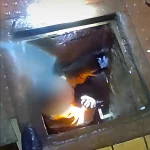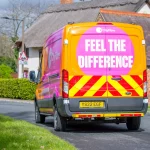Openreach Extend UK Analogue Line Rental Stop Sell Exemptions by 1 Year UPDATE

A new briefing indicates that Openreach (BT) is extending some limited exemptions to their current “stop sell” on new Wholesale Line Rental (WLR) and related broadband ISP products by one year, which means the exemptions will now be removed on 25th March 2025 instead of this year.
In case anybody has forgotten, all Openreach-based UK phone providers and broadband ISPs are currently working toward the final switch-off date (end of 2025) for old analogue phone services (PSTN / POTS), such as by adopting alternative all-IP (internet) based voice solutions – these require some form of broadband connection in order to function (i.e. internet based phone solutions become an optional extra).
As part of this Openreach have already introduced a “stop sell” on sales of their Wholesale Line Rental (WLR) service in September 2023 (here), which underpins a lot of broadband and phone lines in the UK. The WLR product portfolio relies on BT’s old Public Switched Telephone Network (PSTN), hence why you often see both being mentioned in the same breath (it can get confusing).
Advertisement
However, one lesser-known aspect of this is that Openreach included some time-limited exemptions to the aforementioned “stop sell“, which applied to a small portion of premises (homes and businesses) – often in remote rural areas with older setups – where neither Openreach’s full fibre (FTTP) nor SOGEA (standalone variant of FTTC / VDSL2 on copper lines) based broadband services are yet available.
The previous goal of these exemptions was to allow more time so that the network operator could carry out work to ensure that everybody can access FTTP, SOGEA or even SOTAP (like SOGEA but for old ADSL broadband lines) based products by late March 2024. In addition, Openreach and BT have been busy developing a temporary replacement for analogue phone services called ‘SOTAP for Analogue‘ (check link for full summary), but this won’t be available to new provisions (it’s a migration path for existing lines, such as those used by vulnerable people).
However, a new briefing, and article on Thinkbroadband, have both noted that Openreach has extended the aforementioned exemptions to run for an extra year until 25th March 2025. At the time of writing, Openreach have yet to clarify why it will now take a year longer than expected to ensure full availability of their alternative products in such areas, although upgrading some of the oldest parts of their network can be tricky. The fact that the temporary SOTAP for Analogue solution also won’t be ready for launch until later in 2024 may be another factor.
UPDATE 5th Feb 2024 @ 11:17am
Advertisement
Openreach has informed us that the extension was requested by ISPs in order to give them sufficient time to fully consume SOTAP and its product variants, as well as to launch their own SOTAP based product offerings.
Mark is a professional technology writer, IT consultant and computer engineer from Dorset (England), he also founded ISPreview in 1999 and enjoys analysing the latest telecoms and broadband developments. Find me on X (Twitter), Mastodon, Facebook, BlueSky, Threads.net and Linkedin.
« Reminder – CityFibre Offering £200 Cashback to New Customers
Freely’s New Live UK Broadband TV Service to Launch Q2 2024 »






















































The current ISP rental is for ptsn phone and internet. When ptsn is switched off, will we have to pay extra for the voip service? Will the broadband rental be reduced to compensate?
No change going by previous experience: many ISPs haven’t sold regular line rental in a while, all digital voice, and prices barely if at all budged when they moved.
The difference between the two in terms of cost to the ISP is tiny. See https://www.ispreview.co.uk/index.php/2019/08/openreach-sogea-standalone-broadband-starts-early-market-rollout.html for example.
BT (retail) charges £5 less for broadband only service than for BB + PAYG digital voice, but I’m too lazy to do the maths to see how that compared to any legacy plans where line rental was actually split out as a separate item.
OTOH I believe Sky includes as basic form of VoIP service on all broadband connections, with all calls charged as PAYG.
The big difference to the ISPs is that Openreach are not involved with it, aside from paying them for a small amount of prioritisation for VoIP traffic. This means they need to take the it in house, outsource it to someone else, or tell customers you no longer offer phone services.
Public Switched Telephone Network: (PSTN) The answer to your questions is no and no, according to the information supplied by BT.
So “limited exceptions” will be allowed to order PSTN lines until 25th March next year, yet the whole PSTN will be withdrawn by the end of the year. Somehow I think that date may be slipping as well.
Probably to allow time for SOTAP for analogue to be developed and made ready nationally
Totally agree, seems like this becoming a bit of a farce. BT have been visiting different areas of the country since the summer past, informing people they are going to be switched to Digital Voice. This turns out to be nothing more than a public awareness campaign. Nothing happens for the majority, unless you request Digital Voice or your contract is up, then they may try to sell you Digital Voice, as part of a new contract, especially if you have (FTTP) Try asking for DV if you are on a (ADSL) line!
DV/VOIP is the biggest con going. BT will sell their broadband customers an EE SIM for £8 a month which will give you unlimited minutes on their mobile network and any WiFi network. £8 will also buy you 700 VOIP minutes a month which can only be used on one WiFi network alone. It’s nothing but a money-making scam targeted at those who remember when PSTN was their only option and aren’t tech-savvy enough to realise that the world has moved on.
Has to be remembered, not all parts of the UK have good coverage from EE mobile or any network for that matter, and not everyone has a reliable internet connection. The older generation rely on the home phone more than others. Sotap for Analogue may be used more widely and for longer than is anticipated, providing the trials go well and don’t have to be extended.
The overlap of those with both poor 2G mobile reception (the minimum needed for voice calling) AND an unreliable BB connection is very small indeed – in which case, yes, SOTAP for Analogue is the perfect solution. However, for the rest of us, DV is an evolutionary dead end designed solely to protect BT’s PSTN revenue for as long as possible.
it’s important to be accurate when being unnecessarily cynical.
“used on one wifi network” – what on earth does that mean. Yes it is tied to your line, but there’s no wifi involved. The cordless phones use DECT.
Digital Voice is BT’s POTS replacement product, allowing them to close down the PSTN. It offers features that POTS never did, eg multiple calls and HD voice. It is also the easiest way for existing BT customers to keep their landline number. Seems more than an “evolutionary dead end” to me.
BT (or EE now) will happily sell you broadband only, or BB+mobile if you prefer. Not everyone wants a mobile phone however, or may have a need to keep their landline number going.
Don’t forget you are not obliged to have BT digital voice (or any other ISPs VOIP service). There are are plenty of third party VOIP services out there to `port a landline to.
@ed I can only speak for round near me in Suffolk, but if it was a venn diagram the area covered by poor, indoor, 2G coverage would probably almost entirely fit inside the area showing poor broadband. Poor broadband is a pretty good indicator of poor mobile, the reverse rather less so as FTTP has been rolled out to rural areas
This only applies to wholesale so most will still be switched to Digital and even with wholesales most areas will be pushing Digital
In general if DTTP is available you will we switched to Digital
There is no intension of updating pots exchange only lines at local exchange, so how are they going to get round that.
ADSL manages 2.5mbps with the wind behind it, so phone on same line will be a pain.